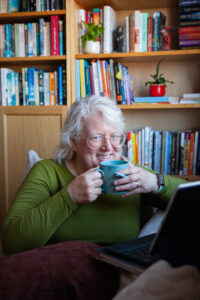Clearness isn't related to Cleaning
Communication should be clear, honest and loving. Or respectful, if you’d prefer that term to ‘loving’ in a work environment.
Quakers have a long history of being honest and clear in their communication. We are called to ‘speak truth to power’, and to raise our voices even when it is uncomfortable or dangerous.
To protect the delicate balance of power and trust, current Quaker peace work and negotiations are not widely talked about. But Quakers work at all levels from peer-group peace education through to national governments, Quaker House Brussels and QUNO.
Communication can happen in the open with everyone involved, or it can happen in smaller groups. But the requirement for trust and respect is vital.

Many years ago I listened to a peace worker who had lived and worked in Northern Ireland say balancing relationships in such a fraught culture was exhausting – but worth it. When there was a possible negotiation he’d been asked to be part of it, and he asked why him, he was told, ‘You’re honest and the only person I trust not to want to kill me’. This saddened him and made him aware of the problems that the lack of honest, clear, and respectful communication had caused.
Clearness Commitee
One of the ways that these honest respectful conversations can happen are in a Clearness Committee. Vin & I had one with members of Colchester Meeting before we got married, and I’ve been part of Clearness Committees twice where the Friends concerned wanted to be supported and have their decisions challenged as they explored the issues.

The same skills which build trust and community at larger scales can be used between two or more people. A Clearness Committee can be used to seek resolution, as the quote below shows, but also to test decisions and preparations that need to be made. We’ve given links to resources below.
"[I] once sat on a clearness committee for a couple [where the husband had had an affair]. They had been married many many years, and are still happily married. What it took for them to get through this was commitment and courage. They both wanted to save their marriage; they both were willing to be radically honest and to listen to the other one speak… Quakers are good at hard conversations. We don't argue or directly respond to each other but instead listen deeply, leave silence in between speeches, go into silence as a group when things start to get heated. There were four or five of us who were willing to sit with the couple, ask questions to help them say what needed to be set, be loving witnesses and supporters of their intention to heal their marriage. They had to be very brave. They had to be brave enough to ask for help from others, which meant opening up the truth about their problem to other people, very hard for a couple whose relationship was looked up to by many as a model. They had to be brave enough to listen to each other's pain and anger, and to take the slow steps needed to heal. They had to be brave enough to admit their failings and take painful steps… It was one of the most amazing experiences of my life, watching these two take it down to the bone and put it back together again."
not that girl, 2010 Anonymous Quaker Metafilter user Tweet
In earlier times Friends saw the need for ‘clearness’ as part of the necessary preparation for marriage. Only after a group of Friends, appointed by the area meeting, had established that there was clearness from other conflicting obligations could they recommend the solemnisation of a marriage. In some North American yearly meetings this practice has been maintained and the concept has broadened. It has become a loving and caring exercise on behalf of the meeting. The couple are helped to explore their commitment to God, to one another and to the meeting, to look in depth at the outcome of previous relationships or marriages, to consider their attitudes towards the care of existing or future children and at how the couple can make decisions about their life together. (See also 16.37–16.39 & 12.10.)
Qf&p 12.22

Wendrie Heywood
MBS Founder






